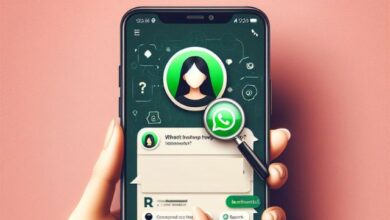Are WhatsApp Calls Encrypted? Unveiling the Truth

Are WhatsApp calls encrypted? This question has become increasingly relevant in our digital age, where privacy and security are paramount. As we delve into this topic, we aim to shed light on the truth behind WhatsApp’s encryption, a feature that has been both lauded for its security and criticized for its potential implications.
WhatsApp, a popular messaging app used by over two billion people worldwide, offers more than just text messaging. One of its key features is the ability to make voice and video calls, a function that has become indispensable in our increasingly connected world. But with this convenience comes the question of security – how safe are our conversations on WhatsApp?
To answer this, we turn to encryption, a method of securing information by converting it into code to prevent unauthorized access. WhatsApp claims to use end-to-end encryption for its calls, meaning only the communicating users can read the messages. In theory, this makes eavesdropping by third parties or even WhatsApp itself impossible. But how true is this claim? And what does it mean for the average WhatsApp user?
In this article, we will unveil the truth about WhatsApp’s encryption, exploring its benefits and potential drawbacks. We will delve into the technicalities of encryption, compare WhatsApp’s security with other communication apps, and address the criticisms and concerns surrounding it. So, let’s embark on this journey to understand the reality of encryption in WhatsApp calls.
Understanding Encryption
Encryption serves as a critical method for safeguarding information by converting it into code, thwarting unauthorized access. This is particularly pivotal in the realm of digital communication, where ensuring the privacy and security of conversations, whether through text messages or calls, is paramount.
Among the various encryption methods, WhatsApp employs a notable one known as end-to-end encryption. This method guarantees that only the communicating users, and no intermediaries, can access the transmitted information. With end-to-end encryption, messages are akin to being secured with a digital lock, and only the designated recipient and sender possess the requisite key to unlock and decipher them.
The application of end-to-end encryption within WhatsApp is specifically evident when engaging in conversations through the WhatsApp Messenger platform. Each message sent via WhatsApp benefits from the Signal encryption protocol, which safeguards the message content right from your device. Consequently, only the intended recipient can decrypt and comprehend the message, ensuring a high level of confidentiality.
Nevertheless, it is crucial to note that the privacy of messages may be subject to the privacy practices of the recipient business once the message reaches its destination. Businesses, which may include employees or external vendors, could be designated to process and respond to the messages. Some businesses opt to entrust Meta, WhatsApp’s parent company, with securely storing messages and managing customer interactions. Notably, Meta assures users that the messages sent to businesses won’t automatically influence the ads they see. Despite this, businesses have the prerogative to utilize the received chats for their own marketing endeavors, potentially including advertising on the Meta platform.
Furthermore, certain companies opt to leverage artificial intelligence (AI) from Meta to facilitate the handling of customer messages. In such cases, Meta receives these chats, contributing to the enhancement of its AI capabilities. To maintain transparency, users are informed when AI from Meta is employed by a business, indicated by a highlighted notification under the business name.
Understanding encryption, especially in the context of WhatsApp’s end-to-end encryption, underscores the significance of maintaining the confidentiality of digital communications. As technology advances, users must stay informed about the nuanced privacy practices employed by businesses and the potential implications of their interactions in the digital landscape.
WhatsApp and Encryption
WhatsApp, a widely used messaging app, has implemented end-to-end encryption across its platform, safeguarding various forms of communication such as messages, media, voice notes, calls, and status updates. In essence, this encryption ensures that only the sender and the intended recipient can decipher each other’s messages, providing a high level of security.
When making calls on WhatsApp, the conversation is automatically secured with a lock, and only the participants possess the unique key required to unlock and access the content. This process occurs seamlessly without the need for users to activate any special settings.
The end-to-end encryption mechanism utilized by WhatsApp is built upon the open-source Signal protocol, incorporating various cryptographic techniques, including public-key encryption. Each user possesses a pair of randomly generated keys – one private and one public. The sender leverages the recipient’s public key to encrypt messages, and the recipient uses their private key to decrypt them. Notably, WhatsApp never gains access to the user’s private key, as it is generated and stored locally on the user’s device.
In a recent development, WhatsApp introduced an additional security feature aimed at safeguarding users’ IP addresses. By enabling the “Protect IP address in calls” feature in settings, users can ensure that all their calls route through WhatsApp’s relay servers instead of establishing a direct peer-to-peer connection. This precautionary measure prevents callers from viewing each other’s IP addresses and discerning geographical locations.
It is crucial to understand that while WhatsApp’s end-to-end encryption secures your calls, the privacy practices concerning received messages are subject to the policies of the associated businesses. Some businesses, choosing Meta as their parent company, may securely store messages and utilize them to respond to customer inquiries.
Although Meta does not automatically leverage these messages for targeted advertising, businesses may use received chats for their own marketing purposes, including advertising on the Meta platform.
The Other Side of the Coin: Criticisms and Concerns
While WhatsApp’s end-to-end encryption offers a level of security, it’s not without its criticisms and concerns.
One of the main criticisms is that while WhatsApp’s encryption secures your calls, it doesn’t protect them from people taking and sharing screenshots of conversations and personal information. This means that even though your messages are encrypted, they can still be shared by the recipient, potentially compromising your privacy.
Another concern is the collection of metadata. Although WhatsApp uses end-to-end encryption, it collects more metadata on you than apps like Signal. This metadata, which includes data such as when you log in, how long you use the app, and who you communicate with, is not protected by end-to-end encryption. This metadata is then shared with WhatsApp’s parent company, Meta, raising privacy concerns.
Furthermore, a report by ProPublica revealed that Facebook employs about 1,000 WhatsApp moderators whose job is to review WhatsApp messages that have been flagged as “improper.” This contradicts the common understanding that end-to-end encryption means that not even WhatsApp can read the messages.
Finally, there have been claims of a security flaw in WhatsApp’s end-to-end encryption, creating a potential backdoor for snooping. This has raised concerns about the possibility of third parties gaining access to WhatsApp messages.
Comparing WhatsApp with Other Communication Apps
When discussing encrypted messaging apps, WhatsApp is not the only player in the field. Several other applications also provide end-to-end encryption, each having distinct strengths and weaknesses.
Signal, a popular choice among security-conscious users, utilizes the same robust encryption protocol as WhatsApp. Notably, Signal distinguishes itself as its parent company operates as a non-profit foundation. Additionally, Signal boasts features such as disappearing messages and the option to secure the app with a password.
Apple’s iMessage is another contender that employs end-to-end encryption. However, its Messages app, responsible for viewing encrypted messages, also handles unencrypted SMS text messages. This dual functionality may lead to confusion regarding the encryption status of a particular message.
Google’s Messages app can incorporate end-to-end encryption, but it requires both parties to enable RCS chats. Consequently, not all messages sent through Google’s Messages app will be encrypted.
In contrast, WhatsApp provides a robust and fully encrypted mobile messaging experience. Recent enhancements include features like end-to-end-encrypted backups and disappearing chats. Despite these advancements, WhatsApp has faced criticism for its collection of metadata and potential security vulnerabilities.
While WhatsApp’s end-to-end encryption contributes to a certain level of security, it is crucial to consider other factors such as metadata collection and the privacy practices of the company. Alternatives like Signal and Apple’s iMessage offer comparable encryption with distinct features and privacy approaches.
FAQ: Are WhatsApp Calls Encrypted
Can WhatsApp calls be monitored?
Yes, WhatsApp calls can be monitored. Although WhatsApp uses end-to-end encryption, meaning only the sender and recipient can access the call data, if your device is compromised by malware, hackers might potentially gain access to your calls.
Can police track WhatsApp calls?
Technically, the police cannot trace WhatsApp calls as the platform uses end-to-end encryption. However, they can access certain metadata such as mobile numbers, device type, mobile network, mobile numbers of contacted people on WhatsApp, data on web pages visited through the app, time of chats, duration of chats, IP addresses, location, and contacts.
Can someone listen to my WhatsApp calls?
It is technically possible for a third person to listen to your WhatsApp calls if they have access to either your device or the recipient’s device.
Can WhatsApp calls and messages be tapped?
While WhatsApp calls and messages are end-to-end encrypted, they can still be tapped if your device is compromised. However, the method for tracking these communications is different from traditional landlines or even cell phones.
Are WhatsApp calls private?
Yes, WhatsApp calls are private. The platform uses end-to-end encryption, ensuring that only the sender and recipient can access the call data.
Is WhatsApp video call safe or not?
WhatsApp video calls are generally safe as they are end-to-end encrypted. However, they are vulnerable to hacking if your device is compromised.
Is WhatsApp encrypted from police?
WhatsApp uses end-to-end encryption, which means that not even WhatsApp itself can access your calls or messages. Therefore, the police cannot access your WhatsApp data unless they have physical access to your device.
Can deleted chats be recovered in WhatsApp?
Yes, deleted chats can be recovered in WhatsApp if you’ve backed them up. WhatsApp automatically backs up your chats every day at 2 am. These backups are stored for a limited time.
Can normal calls be traced?
Yes, normal calls can be traced. However, the method for tracking these communications is different from internet calls like VoIP. Internet phone calls can’t be tracked to a specific location using the same methods that are used for cell phones.
Conclusion
In this article, we’ve unveiled the truth about the encryption of WhatsApp calls. We’ve explored the technicalities of end-to-end encryption, how WhatsApp implements it, and the criticisms and concerns surrounding it.
WhatsApp’s end-to-end encryption ensures that only the sender and receiver can decrypt each other’s messages. This means that your WhatsApp calls are secured from falling into the wrong hands. However, it’s important to note that while WhatsApp’s encryption secures your calls, once the message is received, it will be subject to the business’s own privacy practices.
We’ve also compared WhatsApp’s encryption with that of other popular communication apps. Each app offers its own strengths and weaknesses in terms of encryption. While WhatsApp offers robust and fully encrypted mobile messaging, it has been criticized for its collection of metadata and potential security flaws.
While WhatsApp’s end-to-end encryption offers a level of security, it’s important to consider other factors such as metadata collection and the company’s privacy practices. Other apps like Signal and Apple’s iMessage offer similar encryption with different features and privacy practices.
As we continue to rely on digital communication in our daily lives, understanding the security measures in place, such as encryption, becomes increasingly important.






